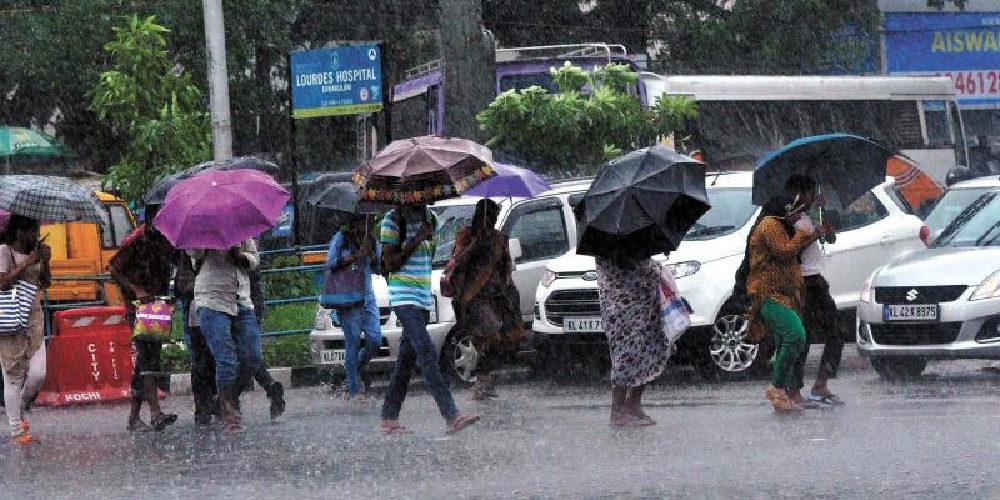News
Eight ways to stay safe during rainy season

The rainy season can be pleasant sometimes; the cool weather, the perfect time to drink a cup of hot tea or coffee, a reason to wear coats and turtlenecks, enjoy snuggle time with loved ones but can also be irritating as it comes with illnesses such as flu, common cold, fever, malaria and others.
To stay safe during this period, there are some simple tips to adopt.
Here are the eight ways to stay safe during rains:
1. DRIVE SLOWLY AND CAREFULLY
Road accidents are quite common during the monsoon season, which is why drivers need to practice extreme caution in this weather. Since wet tarmac can become rather slippery, it is advised to avoid speeding and tailgating (closely following the car in front of you). If the vehicle behind you is tailgating, make sure to put some distance between the two. Avoid making any sudden turns as well.
Moreover, be wary of riding motorcycles while it’s raining, as they tend to slip and fall rather easily on wet roads. If you drive a car, be careful of bikers around you.
2. WASH YOUR HANDS REGULARLY
To keep you from getting a cold, cough and flu, regular hand washing is necessary to prevent the spread of viruses and bacteria. Bacterias and viruses come alive during the rainy season and you can come in contact with them anywhere.
Wash your hands as often as you can with soap and water. It is also advisable to carry a pocket-sized hand sanitiser with you when you go out.
It is important to wash your feet and hands when you get home, especially after contact with rain or flood.
3. BE A WEATHER CONSCIOUS PERSON
You need to stay up to date with the latest news on weather and weather forecasts to avoid going out when there will be a heavy downpour. You can monitor the weather through Radio,TV and the internet.
Follow accounts that share useful information about weather and traffic updates, which might help you to get rid of flooded areas and find alternate routes.
4. AVOID TOUCHING ELECTRIC POLES AND WIRES
Staying away from electric poles and wires is one of the most important safety measures for the rainy season. Do not touch wires that have fallen due to heavy rain or are dangling precariously from the pole.
If you see wires lying in a puddle of water after rain, stay away from it as far as possible since stepping in it can possibly electrocute you.
5. KEEP MOSQUITOES AWAY
Rainy season is the perfect breeding season for mosquitoes. They lay their eggs in pools of stagnant water so you must make sure to sweep away any stagnant water that is around you.
Mosquito repellent spray should be used in the house, burning mosquito coils as well to keep the insects away.
When you need to go outside, wear long sleeved shirts and rub mosquito repellent cream on your arms and legs. Use mosquito nets around your bed too.
6. STAY WARM
It is usually cold outside when it rains, so wear warm clothes to keep your body temperature up.
Cardigans, sweaters, turtlenecks and coats should be part of clothing during this season. They help you stay warm and avoid catching a cold.
Remember to stay out of the rain too if you can.
7. TAKE A HOT SHOWER
Taking a shower after getting drenched in the rain might sound absurd, however taking a hot shower will help raise your body temperature and also get rid of the germs and protect you from many infections. But If you don’t feel like having a shower, try soaking your feet in warm water.
8. AVOID GETTING SOAKED IN THE RAIN
Make sure to always carry an umbrella and rain coat to avoid getting soaked from a sudden downpour. Getting soaked in the rain can cause flu, cold, cough and other rain causing illnesses.
Rain gear such as umbrellas, rain coats, rubber boots helps to protect you from getting soaked and shields you against cold or fever.
Wearing rubber boots is advisable to protect yourself against possible viruses and germs that could be in the water.
News
A Chat with Janet Odio Okolo: A Mother’s Journey Raising a Child with Down Syndrome

News
Hon. Nnamchi Begins Street Lights Deployment In Isi Uzo(Photos)

Honourable Paul Sunday Nnamchi, representing Enugu East/Isi Uzo Federal Constituency in the 10th House of Representatives, has fulfilled his promise to illuminate communities in Isi Uzo Local Government Area.
The lawmaker has just begun the deployment of high-density solar-powered street lights in Ikem Nkwo, marking the beginning of a massive rollout of the street lamps across the communities in Isi Uzo.
This initiative, which started in Enugu East Local Government Area in 2024, aims to support the fight against insecurity in the state which according to him was to add to what Chief Security Officer of Enugu State Barrister Peter Mba had done to secure the state to attracts foreign investments.
The lawmaker expressed concern over banditry attacks, particularly by herdsmen, in some communities within Isi Uzo and Enugu East Local Government Areas in the recent pasts.
He believes that illuminating these areas with high-density street lights would help address the insecurity adding that he was prioritizing border and farming communities in Isi Uzo, where banditry has displaced residents and restricted farming activities.
Communities in Ikem, Eha-Amufu in Isi Uzo which borders Enugu and Benue State and Ugwogo-Nike in Enugu East have been vulnerable to these attacks due to their strategic locations.
News
May Day: Kalu Hails Workers, Applauds Their Role in Nation Building

By Gloria Ikibah
Deputy Speaker of the House of Representatives, Rep. Benjamin Kalu, has extended warm wishes to Nigerian workers as the country marks the 2025 edition of International Workers’ Day.
Kalu praised workers across various sectors for their commitment and resilience, describing them as the engine that keeps the nation moving. He acknowledged their sacrifices and unrelenting drive, especially during tough economic times.
In his message, he highlighted the efforts of the current administration under President Bola Tinubu to improve the welfare of public servants. He referenced the National Assembly’s prompt backing of the new minimum wage as a sign of the government’s seriousness about workers’ wellbeing.
The Deputy Speaker appealed for continued patience and understanding from Nigerians, noting that the ongoing economic reforms, while challenging, are designed to bring long-term relief and prosperity.
Kalu also called for unity, and said the country can only overcome its present difficulties if citizens and leaders work together in good faith.
He therefore urged workers to keep the faith and remain steadfast in their duties, assuring them that brighter days are on the horizon, and wished Nigerian workers a peaceful and fulfilling May Day celebration.
-

 Metro22 hours ago
Metro22 hours agoGunmen storm University of Benin teaching hospital, kill doctor
-

 Metro23 hours ago
Metro23 hours agoFCTA destroys 601 motorbikes over violations
-

 News14 hours ago
News14 hours agoAlleged money laundering: EFCC produces Aisha Achimugu in court
-

 News22 hours ago
News22 hours agoJust in: FG declares tomorrow public holiday
-

 News16 hours ago
News16 hours agoJUST IN: Major General Paul Ufuoma Omu Rtd, dies at 84
-

 News15 hours ago
News15 hours agoTinubu hails Dangote’s World Bank appointment
-

 News18 hours ago
News18 hours agoSAD! Professor’s son takes own life inside varsity staff quarters
-

 News9 hours ago
News9 hours agoHon. Dennis Agbo Resigns From Labour Party











